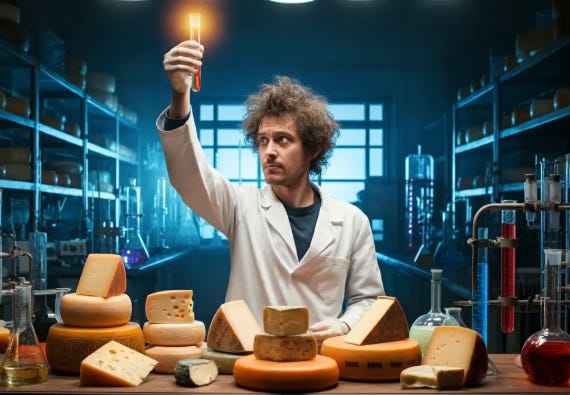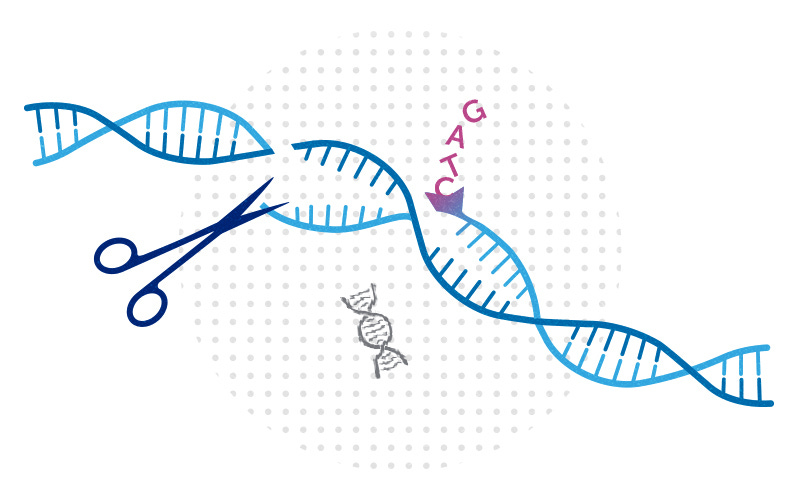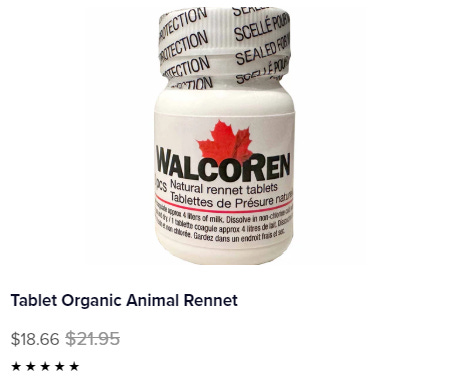The Perils of GMO Cheese
Everything goes better with cheese. It tastes great and is an excellent source of calcium, protein, and essential nutrients. Fermented cheeses, in particular, contain probiotics that promote gut health. While cheese is calorie-dense, moderate consumption is part of a balanced diet and good health.
Unfortunately, the commercial production of cheese has resulted in several issues:
Added Ingredients: Some commercial cheeses may contain added ingredients like salt, stabilizers, and artificial flavors that affect the overall nutritional profile.
Processing Techniques: Pasteurization can impact levels of certain vitamins and enzymes.
Health hazards: GMO Rennet
Rennet, the point of my focus, is a mixture of enzymes that typically comes from the stomachs of certain animals, like calves. The main enzyme in rennet is called chymosin, which helps milk coagulate and form curds. Historically, animal Rennet has been essential to this process, producing the classic cheese texture and taste we enjoy.
Of course, the food industry came along and developed various types of rennet beyond traditional animal sources. One of these is known as Fermentation-Produced Chymosin (or FPC). It was developed in the 1980s using CRISPR gene editing, becoming the first bioengineered product allowed in U.S. foods. There are some serious health issues with this technology though:
Studies have suggested that CRISPR may cause cells to lose their cancer-fighting ability and that it may do more damage to genes than previously understood.
Large DNA rearrangements can occur up to 5-6% of the time, which could potentially trigger cancer.
The technology might worsen natural processes such as retrotransposition, potentially leading to unforeseen genetic modifications.
The evidence is downplayed because this Frankencheese comes to you thanks to the morally decrepid folks at Pfizer. This is the same company that gave us those super-safe vaccines during the Covid-19 outbreak. As of 2012, approximately 90% of all commercial cheese production in the United States used FPC, and this percentage likely increased further since then, though exact current figures aren’t provided.
In the U.S., FPC isn’t required to have special labelling because it’s classified as "generally recognized as safe" (GRAS). Does that mean it’s healthy? Not if you look at the broader context. Pfizer and the FDA frequently work together to promote positive stories about certain products, whether it's a genetically engineered "rennet" or a contentious vaccine. Similar to the COVID-19 vaccine studies, research on this “vegetable” Rennet was rushed, leading to a scarcity of meaningful data and a downplaying of potential adverse effects.
What to Do?
To avoid GMO rennet in cheese, you have several options:
Buy Organic Cheese: Organic standards prohibit the use of genetically modified organisms, including GMOs in animal feed.
Non-GMO Project Verified: Look for cheese that has been verified by the Non-GMO Project, which ensures that the product doesn’t contain GMOs.
Artisanal or Farmstead Cheese: Buy cheese directly from local farms or artisanal producers who make cheese traditionally and without GMO’s.
Read Labels: Buy raw milk cheese and make sure it says “animal rennet” on the ingredient list.
Shop at Farmers Markets: Engage with local farmers and cheese producers at farmers markets, where you can ask about their production methods.
Research Brands: Conduct research or contact cheese brands directly to inquire about their use of GMO ingredients or rennet.
By taking these steps, you can make more informed choices and find cheese that aligns with your health preferences.
Make Your Own Cheese
You can make cheese naturally as a fairly simple process (video below) by buying a cheese-making kit. Here’s one company that definitely does not use GMO Rennet:
They have workshops and other cheese-making supplies, such as cheese-making starter kits. It’s just one example, of course, but they’re mentioned in the video below, so I thought I would look them up.
However, cheese can also be made naturally without using traditional rennet. There are alternative methods and ingredients that coagulate milk and form curds.
One common method is using acids like lemon juice or vinegar, which can cause milk to curdle and form simple cheeses such as paneer or ricotta.
Another approach involves using plant-based coagulants. These are derived from plants like thistles or figs and contain natural enzymes that can curdle milk, much like animal rennet.
Microbial cultures, which are naturally occurring bacteria, can also be used to initiate coagulation in certain cheese varieties.
This video below outlines the super easy steps to make your own natural, healthy cheese, with a little bit of patience!
Hopefully this article helped you avoid a health hazard you may have otherwise overlooked. Keep reading and stay healthy!
Your presence here is greatly valued, and that’s why all our articles are free on this site. But if you've found that the content benefits your life, please consider supporting it through a cost-effective paid subscription. This plays a vital role in covering operational costs and supports the continuation of this independent, unbiased research and journalism work. Thank you!!
If shy about commitments, feel free to leave a one-time tip!








